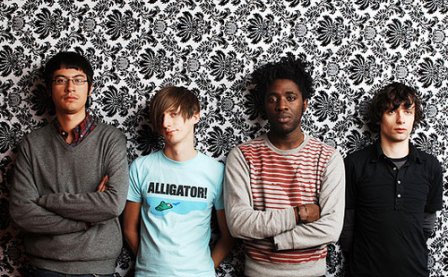“And you cannot run or ever, ever escape,” Kele Okereke sang on “Positive Tension.” It was a prescient statement. Following their 2004 debut Silent Alarm, Bloc Party have, in a sense, never stopped running, attempting escape. With that album, the band had achieved what seemed like the impossible: crafting a terse pop formula so captivating in its cohesion and catharsis that it ostensibly signified the apotheosis of a fast-fading scene.
Uncomfortable with their newfound fame and never content to stay in one place, the band promptly abandoned ship in favor of a more static sound, one that borrowed as much from Radiohead as it did their post-punk idols. By 2008, though, this had only served to confirm an already tired career trajectory — a mold of the kind that the band had fought so hard to deny. So they embarked on an indefinite hiatus. But by 2012, they were back, and with them Four, their statutory “back-to-basics” record: an attempt at historical revisionism so boldly obvious it was almost insulting. Needless to say, the album didn’t stick to the proverbial wall. They came, they saw, they went on hiatus again.
So here we are: 12 years, 3 albums, and 2 fewer original members post-debut, Bloc Party are at it again again with Hymns. Like Franz Ferdinand or Interpol or The Strokes, Bloc Party didn’t have to keep making records. But if there’s anything that has set Bloc Party apart from the fold, it’s their work ethic, a sincere enthusiasm for the craft, one that’s only diminished with each consecutive release. On Hymns, any potential energy leftover is squandered for a motionless sound, a resounding silence that is neither quite here nor there. Hymns, unfortunately, does not mark the logical next step for the band, nor does it exactly tread new ground. Rather, it denotes a descent into self-indulgence that’s paradoxically reckless and complacent.
As Okereke might put it, Hymns is the record on which Bloc Party set aside all grievances and expectations, and make the record they want to make. To be fair, that’s mostly the case. “I’ve never been too concerned with how people are going to react to things,” Okereke said in a 2015 interview with Rolling Stone. Whether or not that’s true, Bloc Party have always functioned as a vehicle for Okereke’s deepest, darkest discussions of self — pained love letters, exclamations of lust, embittered self-talk. Hymns is no exception. Gone, however, are the anxieties of adolescence: crippling insecurity, fears of rejection, etc. Bloc Party are grown-ups now, and Hymns wears its supposed maturity on its sleeve. This is their “spiritual” album and, as the title suggests, Hymns is inspired by the devotional: these are songs of salvation, of deliverance by the way of joy and love, life’s most natural highs.
The sentiment, justified as it may be, doesn’t translate so well onto vinyl: there are many questionable stylistic choices here. Written and recorded over a period of five months, Hymns feels both belabored and rushed, creating a temporal dissonance that clouds an understanding of the band’s objectives. Several tracks feature Okereke front and center, relegating the rest of the band to second-tier status that serves neither well, only furthering an increasing perception of Bloc Party as an Okereke-helmed vanity project. Okereke often, and ill-advisedly, employs his quasi-trademark bass-baritone, an affected low mumble he honed on solo releases The Boxer and Trick. And while it surely suits the confessional nature of his lyrics, it’s not a voice that complements the band’s persona. And for all the talk, both literal and figurative, Hymns’s gospel hardly shines through, ultimately scanning like an empty canvas. “I used to find my answers in the Gospels of St. John, but now I find them at the bottom of this shot glass,” he croons on “The Good News.”
Stylistically, Hymns attempts to synthesize every dimension of Bloc Party’s history into three-to-four-minute nuggets, which seems like the making for a good listen, but in practice sounds muddled. Opening track and lead single “The Love Within” sounds like a rejected demo from Okereke’s solo sessions or maybe 2008’s Intimacy, featuring a jarring Deacon-esque organ that curdles upward and then abruptly changes key, giving way to chugging rhythm guitar cherry-picked from Silent Alarm. It works, surprisingly, but just barely. There are several moments like this throughout the album. A Weekend in the City proved Bloc Party could pull off a subdued sound without compromising their ethics or ferocity, but the parallel middle third of Hymns is of no note whatsoever, simply wasted time, better suited for an EP or even a loose SoundCloud freebie. “The Good News,” in particular, is a bizarre, crude caricature of country-pop, or maybe gospel rock, that — no matter its intentions — does not sound like Bloc Party, past or present.
But what should a band sound like at this stage in its career? To call Hymns a disappointment would be beside the point: Bloc Party have not released a consistently enjoyable album for almost a decade, and to expect them to do so now would be foolish. Despite this, it’s difficult to enjoy Hymns without repeated listens, an effort it’s simply not willing to reciprocate. The album is a tiresome listen, almost as tiresome as the narrative arc — “former post-punk revival band releases album to diminished returns” — it inhabits. Hardly necessary, Hymns will be of little interest to anyone but the most devoted Bloc Party fans, those of us who still clutch their compact disc copy of Silent Alarm like some sacred relic, who still know the lyrics to “Banquet” and “Helicopter” by heart, who are still intoxicated by a younger Okereke’s yearning for a deeper, truer love. There’s a small part of us Bloc Party fans still holding out for a Second Coming. The question is: is it worth waiting for?
More about: Bloc Party




